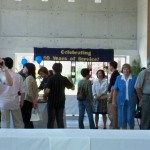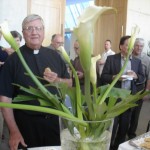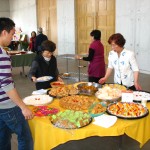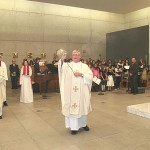Today’s gospel is from Matthew and his telling of Jesus choosing the 12 disciples and sending them out to the lost sheep of the house of Israel. They are to proclaim the good news that the kingdom of God is near. Jesus warns them that they are to expect opposition from the religious authorities just as he did. They are not to fear those who could kill their bodies but they are to fear those who can kill their souls. What are the forces and who are the people in our lives today that can kill our souls?
We are to fear those forces or attitudes of indifference in our lives that can kill our sense of love and justice. We should fear those mindsets which we pick up from our upbringings and our friendships that numb us to suffering and injustices good people endure every day of their lives. Pope Francis calls it a global indifference, dullness to sufferings of good hard working men and women victims of social injustice, exploitation and racism.
Any mindset or attitude that lets us see another person as less than ourselves, less than a beloved son or daughter of God, less than a brother or sister of the Christ who died for all of us is a mindset that is fatal to our souls. It deadens the life of God in us.
These past weeks TV stations have covered worldwide stories of people protesting police brutality toward Blacks and other people of color. The outrage originated from a TV coverage of a police officer knelling on the neck of a black man during an arrest. A Black man begging, ‘I can’t breathe.’ A black man who died!
It was like a shot heard around the world. Enough of this brutality.
People everywhere have taken the action of bending the knee to show their rejection of acts of violence sprung from racist attitudes, by people with authority over another person.
Bending the knee is an act of resistance to any abuse of power, sprung from racism, be it by police officers, or people in power in the business world or medical profession, the teaching profession, or in the church. Bending the knee is a rejection of the inbred racism that affects all of us, the way we see people different from ourselves either by way of race, religion or sexual orientation.
Jesus tells us ’nothing is covered that won’t be uncovered, nothing is hidden that won’t be exposed to the light of day. This is so true in our day. Cameras are everywhere
Do not fear those who kill the body, fear those who kill the soul.
Pope Francis’ reaction to George Floyd’s killing speaks to every one of us, “we cannot tolerate or turn a blind eye to racism and exclusion in any form and yet claim to be defenders the sacredness of every human life”.
Do not fear those who kill our body but fear those who kill our soul, those who lure us into a sense of indifference to the social ills that surround us, or lure us into a sense of superiority over other people. These kill our soul.
As we continue this Mass we pray for every person who is a victim of racism and bigotry, may they never lose sight of their own dignity.
 Founded by St. Paul of the Cross, every Passionist takes a special vow to spend his or her energies in promoting remembrance of the sufferings of Jesus, the memory of the Cross, and reflection of the meaning of the Cross for the world.
Founded by St. Paul of the Cross, every Passionist takes a special vow to spend his or her energies in promoting remembrance of the sufferings of Jesus, the memory of the Cross, and reflection of the meaning of the Cross for the world.




